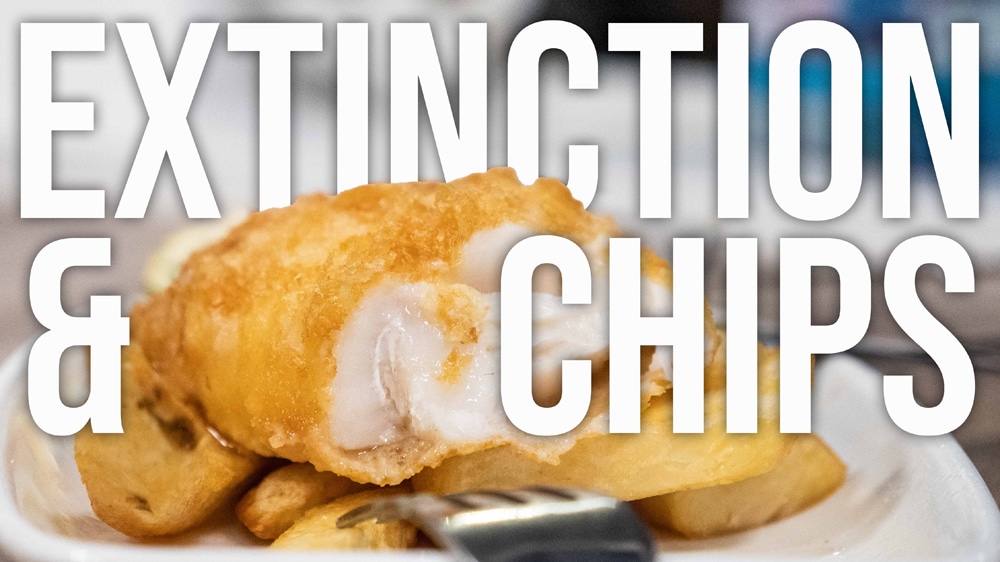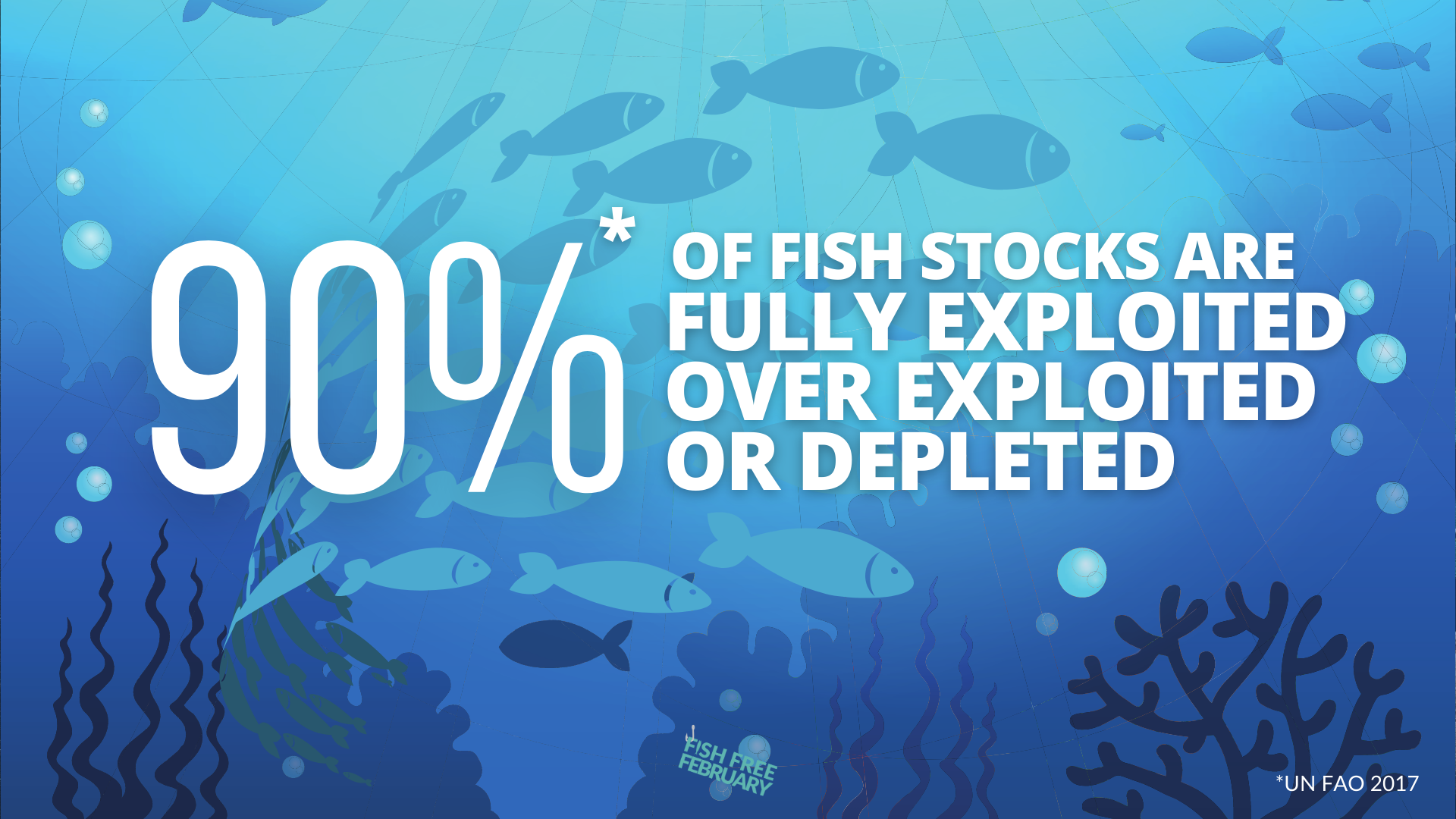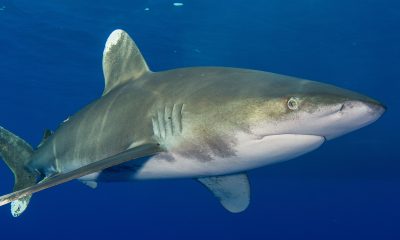Marine Life & Conservation
Go Fish Free this February

 There are no longer plenty more fish in the sea! Fish Free February challenges you to help protect our oceans by removing seafood from your diet for 28 days and helping to raise awareness of the issues caused by intensive fishing practices.
There are no longer plenty more fish in the sea! Fish Free February challenges you to help protect our oceans by removing seafood from your diet for 28 days and helping to raise awareness of the issues caused by intensive fishing practices.
Our oceans are in a state of global crisis, brought about by ocean warming, acidification, pollution, and habitat destruction. However, the biggest immediate threat to ocean life is from fisheries. Each year an estimated 1-2.7 trillion fish are caught for human consumption, though this figure does not include illegal fisheries, discarded fish, fish caught to be used as bait, or fish killed by not caught, so the real number is far higher. It is no wonder then, that today nearly 90% of the world’s marine stocks are fully exploited, overexploited or depleted. If we do not act fast, overfishing and damaging fishing practices will soon destroy the ocean ecosystems which produce 80% of the oxygen in our atmosphere and provide three billion people with their primary source of protein.
Fish Free February, a UK-registered charity, is challenging people around the world to take action for marine life in a simple but effective way. Take the Fish Free February Pledge and drop seafood from your diet for one month, or beyond. Fish Free February wants to get people talking about the wide range of issues associated with industrial fishing practices and putting the well-being of our oceans at the forefront of dietary decision-making. A third of all wild-caught fish are used to create feed for livestock, so Fish Free February urges us to opt for plant-based dishes as a sustainable alternative to seafood, sharing our best fish-free recipes on social media with #FishFreeFebruary and nominating our friends to do the same.
“Not all fishing practices are bad” explains Simon Hilbourne, founder of Fish Free February. “Well-managed, small-scale fisheries that use selective fishing gears can be sustainable. However, most of the seafood in our diet comes from industrial fisheries which often prioritise profit over the well-being of our planet, resulting in multiple environmental challenges. In some cases, the fishing industry has even been linked to serious human rights issues such as forced labour and human trafficking! Fish Free February hopes to shed more light on fishing practices, create wider discussion around these issues, and offer solutions to benefit people, wildlife, and the natural environment.”
To learn more about these issues and to take the Fish Free February pledge visit www.fishfreefebruary.com
Marine Life & Conservation
Double Bubble for Basking Sharks

 The Shark Trust is excited to announce that, for two more days only, all donations, large or small, will be doubled in the Big Give Green Match Fund!
The Shark Trust is excited to announce that, for two more days only, all donations, large or small, will be doubled in the Big Give Green Match Fund!
Donate to Basking in Nature: Sighting Giants
The Shark Trust is hoping to raise £10k which will be doubled to £20k. This will go towards Basking in Nature: Sighting Giants. And they need YOUR help to reach they’re goal.
The Shark Trust’s citizen science project is to monitor and assess basking sharks through sightings; encouraging data collection, community engagement, and promoting nature accessibility. This initiative aims to enhance health and wellbeing by fostering a deeper connection with British Sharks.
Campaign Aims
- Increase citizen science reporting of Basking Sharks and other shark sightings to help inform shark and ray conservation.
- Provide educational talks about the diverse range of sharks and rays in British waters and accessible identification guides!
- Create engaging and fun information panels on how to ID the amazing sharks and rays we have on our doorstep! These can be used on coastal paths around the Southwest. With activities and information on how you can make a difference for sharks and rays!
- Promote mental wellbeing through increasing time in nature and discovering the wonders beneath the waves!
Donate, and double your impact. Click Here
Marine Life & Conservation
Leading UK-based shark conservation charity, the Shark Trust, is delighted to announce tour operator Diverse Travel as a Corporate Patron

 Corporate Patrons provide a valuable boost to the work of The Shark Trust. The Trust team works globally to safeguard the future of sharks, and their close cousins, the skates and rays, engaging with a global network of scientists, policymakers, conservation professionals, businesses and supporters to further shark conservation.
Corporate Patrons provide a valuable boost to the work of The Shark Trust. The Trust team works globally to safeguard the future of sharks, and their close cousins, the skates and rays, engaging with a global network of scientists, policymakers, conservation professionals, businesses and supporters to further shark conservation.
Specialist tour operator Diverse Travel has operated since 2014 and is committed to offering its guests high quality, sustainable scuba diving holidays worldwide. Working together with the Shark Trust will enable both organisations to widen engagement and encourage divers and snorkellers to actively get involved in shark conservation.
“Sharks are truly at the heart of every diver and at Diverse Travel, we absolutely share that passion. There is nothing like seeing a shark in the wild – it’s a moment that stays with you forever!” says Holly Bredin, Sales & Marketing Manager, Diverse Travel.
“We’re delighted to celebrate our 10th year of business by becoming a Corporate Patron of the Shark Trust. This is an exciting partnership for Diverse and our guests. We will be donating on behalf of every person who books a holiday with us to contribute towards their vital shark conservation initiatives around the world. We will also be working together with the Trust to inspire divers, snorkellers and other travellers to take an active role – at home and abroad – in citizen science projects and other activities.”
Paul Cox, CEO of The Shark Trust, said:
“It’s an exciting partnership and we’re thrilled to be working with Diverse Travel to enable more divers and travellers to get involved with sharks and shark conservation. Sharks face considerable conservation challenges but, through collaboration and collective action, we can secure a brighter future for sharks and their ocean home. This new partnership takes us one more valuable step towards that goal.”
For more information about the Shark Trust visit their website here.
For more about Diverse Travel click here.
-

 News3 months ago
News3 months agoHone your underwater photography skills with Alphamarine Photography at Red Sea Diving Safari in March
-

 News3 months ago
News3 months agoCapturing Critters in Lembeh Underwater Photography Workshop 2024: Event Roundup
-

 Marine Life & Conservation Blogs2 months ago
Marine Life & Conservation Blogs2 months agoCreature Feature: Swell Sharks
-

 Blogs2 months ago
Blogs2 months agoMurex Resorts: Passport to Paradise!
-

 Blogs2 months ago
Blogs2 months agoDiver Discovering Whale Skeletons Beneath Ice Judged World’s Best Underwater Photograph
-

 Gear Reviews3 months ago
Gear Reviews3 months agoGear Review: Oceanic+ Dive Housing for iPhone
-

 Marine Life & Conservation2 months ago
Marine Life & Conservation2 months agoSave the Manatee Club launches brand new webcams at Silver Springs State Park, Florida
-

 News3 months ago
News3 months agoWorld’s Best Underwater Photographers Unveil Breathtaking Images at World Shootout 2023



















